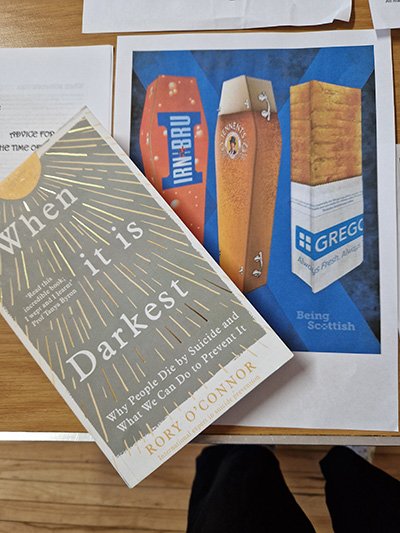Discussing Death at Glasgow’s Death Café
05 September 2023
05 September 2023
Death Cafés are places where people can come and talk about death in a safe environment.
 Death Café. The concept seems odd, talking about death with tea or coffee and cake. Death is inevitable and the aim of the cafés is to talk about death sensitively and for everyone to know their options to have a “good death” when the time comes. People who attend may be grieving, seeking information or facing death themselves. A Death Café is not dependant on faith, anyone from any background and belief can join.
Death Café. The concept seems odd, talking about death with tea or coffee and cake. Death is inevitable and the aim of the cafés is to talk about death sensitively and for everyone to know their options to have a “good death” when the time comes. People who attend may be grieving, seeking information or facing death themselves. A Death Café is not dependant on faith, anyone from any background and belief can join.
Deacon Bob Stoner from the Strathclyde Circuit started the Death Café in Glasgow last September at Pollokshaws Methodist Church. “It's a taboo subject in Scotland. People don't want to talk about it, especially older people. So, we wanted to broach the subject in a different way.” This is not a conference or a presentation, so even if there is a topic, there is no agenda and the attendees are the hosts. The questions of those who attend lead the conversation or they can even lead the session themselves if they are comfortable doing so. Death Café is about bringing people together and engaging in a vast array of topics.
There are several ways of illustrating death, showing funny images, sharing quotes, welcoming “myth busters” such as the crematorium manager and the undertaker, and sharing anecdotes – such as the lady who wanted cows in the crematorium. After negotiation, they reached an agreement on having an inflatable one. “We don’t often get the chance to say what we want, but she had it. Death Cafe is about getting people to think, what do I want and helping them take control of their lives,” adds Bob, “We've asked people if they would like to come along to a crematorium visit so they can see behind the scenes.”
This Death Café in Glasgow has various forms: a monthly session with coffee and cake but also a weekly lunch with well-being talks, games and crafts. “The councillors around here told us no one is going to come to a Death Café," remembers Bob. Some Death Cafés are online, but Bob prefers when they are in person, “If we talk about something which could be traumatic, close to home and they are online, I can't see what's going on. If people are here with us and they're crying, we can go and support them.”
Every event is advertised on the worldwide Death Cafe website. Every week, about 15 to 20 people come to Pollokshaws to talk about death, but they also have people from all over the world come to their monthly session such as Americans and even a holidaymaker from Germany who popped in while visiting Glasgow. Among the myth busters invited were someone from Hong Kong bringing their understanding of death and also two Soul Midwives who discussed their work and beliefs, notably one was married to a Hindu, so she shared her faith interpretation of death.
Initially, the questions are almost ordinary, such as what happens at the crematorium and what the cost of the funerals will be. But very quickly, they go further. What else can you do? They broach notably the subjects of non-traditional burials such as terramation or being buried in a sheet instead of a coffin. “The Death Café allows people to ask any question. They want to be knowledgeable and be in control of their lives,” adds Bob.
Death, of course comes to us all and it can be unexpected, so recently, Bob started a Death Cafe at the University of Glasgow, meeting a different group of people (students and staff) with different questions and needs. During one session, someone from the Netherlands mentioned euthanasia and a deep and interesting conversation followed. “It made us think if someone is in agony, what do we say as a church? How do we respond to that? No topic is off the table,” concludes Bob.
Check out Bob’s blog where he expands on Death Cafés
Interested? Find the Death Café nearest to you
You can also read resources from the Methodist Church regarding death and dying.